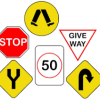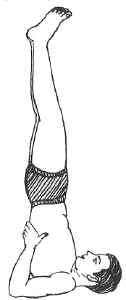
Harvard Study shows major benefits of Peanut Butter
#11

Posted 19 March 2007 - 08:18 AM
Bonking? In my country that's the term we use for doing the horizontal mombo...
mm
#12

Posted 19 March 2007 - 08:41 AM
Oh Doctor, shame on you, medical problem and you don't know.Lots of energy without any bonking
Bonking? In my country that's the term we use for doing the horizontal mombo...
mm
From Wikipedia, the free encyclopedia,
Bonk has long been a colloquial term, slightly jocular in its connotation, meaning sexual intercourse, but has recently become more commonly used as a jargon term by endurance athletes, primarily cyclists and long-distance runners, to describe a condition when the athlete suddenly loses energy and fatigue sets in, usually caused when glycogen stores in the liver and muscles are depleted, resulting in a major performance drop.
The term can be used both as a noun ("hitting the bonk") and a verb ("to bonk halfway through the race"). This condition is also known to long-distance (marathon) runners, who usually refer to it as "hitting the wall". It is also referred to as the "green grass" as pupil dilation causes vivid hues to appear. Such fatigue can become seriously debilitating; for example in cycling, due to the support provided by the bicycle, exhaustion can reach the point where the cyclist is unable to stand.
Whenever athletes are engaged in exercise over a long period of time, their bodies produce energy via two mechanisms:
? via fat metabolism and
? via breakdown of glycogen into glucose, followed by glycolysis.
How much energy comes from either source depends on the intensity of the exercise. During intense exercise which approaches one's VO2 max, most of the energy required comes from glycogen.
The average human body usually stores enough glycogen to generate 1500 to 2000 kcal of energy. Intense cycling or running can easily consume 600-800 or more kcal per hour. Unless glycogen stores are replenished during exercise, after 2 hours of continuous cycling or 15 to 20 miles (24 to 32 km) of running, glycogen stores will be depleted. Symptoms of depletion include general weakness, fatigue, and manifestations of hypoglycemia, such as dizziness and even hallucinations. Symptoms will not be relieved by short periods of rest. This condition is potentially dangerous and should be avoided.
>also the new teenage term for spacing out on drugs<
mss
A DOG ALWAYS OFFERS UNCONDITIONAL LOVE. CATS HAVE TO THINK ABOUT IT!!
#13

Posted 19 March 2007 - 08:43 AM
Mark S Young
Wall Street Sentiment
Get a free trial here:
http://wallstreetsen...t.com/trial.htm
You can now follow me on twitter
#14

Posted 19 March 2007 - 01:13 PM
Edited by esther231, 19 March 2007 - 01:15 PM.
#15

Posted 19 March 2007 - 02:09 PM
I haven't noticed any difference between supplements and eating the stuff I mentioned. Sad, eh?
I like fig newtons more than gel packs so I'm happy I didn't notice a difference.
I agree with you on eating enough. When I first started riding, I didn't know anything about how to eat for a ride. Before, during and after. It was such a struggle to get any distance. I felt exhausted quickly. People on the cycling boards do talk alot about eating during a ride. But they don't talk as much about recovery food. Or eating before a ride. So, it took time for me to learn those things. I eat before a ride, during a ride and after ride now and it's helped a ton. Not heavy food but I need fuel to do the work I want to do.
You clearly are involved in serious training. What are you working on?
Exactly you don't want food without much fat or fibre i.e. something really high glycemic, because what you want is to provide readily available glucose , and also to spike up your insulin to drive that glucose into muscles A.S.A.P. ...so fig newtons will do the job nicely, and like you say, who wants to eat tubes of sugarly paste! heck, I try not to eat sugary stuff any other time, so before/during/after exercise i'm going to have it.
There's alot of research been done of recovery which i've followed. It used to be all about pre-exercise nutrition because everyone obsessed about glycogen levels in muscles, then it became all about post exericse nutrition because of 'glycogen windows', and now finally studies are showing the MOST important is during exercise nutrition....but like you have found, all 3 are important.
What am I working on?
Good question, and somewhat hard to answer, the short answer is I work on optimizing my genetic potential in every aspect of health, that might need some 'splainin though, which takes quite a few words below.
Basically I started out as a teenager as a middle disance/long distance runner - miles to half marathons, I also did alot of cycling like yourself, similar mileage - ran 100miles wek, cycle 70 miles week. I learned alot about the science of training as it was then - all about heart rates, Vox2 ..intervals, fartlek, periodization bla bla. On university running team I met some international hopeful atheletes, and we trained together everyone from 400 metre to distance....and so I learned from sprinters about using weights, anaerobic training etc.....I was amazed how 'fit' the 400metre runner were...they could run a sub 5.00minute mile with us 'runners'....set the mind thinking, what the heck is 'fitness' anyway - who's fitter a sprinter or a distance guy?
Anyway, I also met a bodybuilder, who wanted to run with us to 'get cut', say what?...so I learned alot from the bodybuilders about their training.
Bottom line is meeting people who trained in such different ways, I realized there was lack of science of exercise to say what is fitness etc. Things have moved forward alot since then, but we still don't have a precise scientific definition of fitness.
After much research the best definition that I could find, is to maximize your genetic potential in every system in 'exercise physiology'.
- Genetic potential being the limits your gene's put on your bodies capacity to change, human adaptions have limits (naturally at least) such that the more you train, you hit the law of diminishing returns - I'm sure you know it well, initial improvements are easy, but I remember training for months just to cut 1 or 2 second off my mile times.
- Exercise physiology is harder to define, but refers to all body systems which directly function to cause movement - muscle fibre's, tendons/ligaments, heart, lungs, energy systems( aerobic, lactate,creatine-phosphate - krebbs cycle, ATP's bla bla)
The bottom line is I swapped from 'training for performance in a specific event' e.g. runner/cycle to trying to optimize, or at least get the eay gains in every aspect.
As I learned more about nutrition which has been a life long interest, I realized the ultimate goal is 'optimum health' - the optimal operating state of every body system. Because for example, you can optimize your exercise physiology whilst damaging bodily systems - many athletes have severe injuries, or damanged immune systems( I did that through overtraining in my late teens').
SO what do I actually do ?
I train with weights, I run, I bike, I swim, I do yoga - but I train in very specific ways that try to
1. optimize gains for minimum time/energy cost. - I dont' want to 'waste precious body resources', I want the maximum signal to 'adapt' to my body.
2. try to train every system I described above.
For example I have trained using a method now popularized as HIT with weights for last 10 years, but incoperating what's calle a TUL protocal - time under load, and all sorts of fun training ideas that actually work - I tried all the others that didn't work first of course such is the learning curve.
This means my performance level is lower than if I trained specifically. If I were going to compete in an event, you want to train SPECIFICALLY. There is another reason for that, which is hard to take for most of us but is scientifically true, but that a large % of what is perceived as 'fitness' is really just motor-neuron learning. We don't perceive that learning to walk make you 'fit', but the majority of the difference between a college athlete, and an elite athlete is simply SKILL, not fitness. the Vox2 levels in studies are only about 2% higher between these groups. So, if you want to compete, you want mass reptition to train motor neurons (skill), and specialize adaptation.
Out of all this, the most important lesson i've learned is -
1. Genetics is about 2/3 of ability in anything - muscle fibre makeup, VOx2 etc, motor neuron learning capacity etc
2. Performance is about specialization - its 'specialized fitness', and it doesn't necessarily make you 'healthy'.
3. Total fitness and health are about non-specialization, trying to improve every system on the easy part of its adaptation curve, before the law of diminishing returns kicks in.
All that might raise more questions than it answers...if so, I have no problem answers any questions.
Mark
Edited by entropy, 19 March 2007 - 02:13 PM.
#16

Posted 19 March 2007 - 02:26 PM
Hey, guys.
Do you eat steel-cut oats? I've recently been buying them for both fiber and food (I love the flavor and will eat them raw in a pinch). I've been amazed at how they "stick with me" for hours. Lots of energy without any bonking.
Would that be a good "pre-ride" food?
I'll tell you, for a day of physical work, a bit of goetta (pin oats and lean ground pork and beef--google it) has got to be the best food ever. I doubt it would be good for a ride--too much protein, but for less cardio oriented activity, it's pretty darned yummy.
Mark
I ought to eat them, haven't tried it, but they have a great nutritional profile. They stick with you because of the very high fibre content, which slows the absoption, and by bonking I guess you mean no insulin spikes/valleys?....due to fibre.
Best pre-ride food is somehing a bit higher glycemic and more easily digested, like esthers bananna that the stomach can easily breakdown....you might get some stomach problems with oats..
Oats would be great for a long hike, which I do, I will try it.
Mark.
Edited by entropy, 19 March 2007 - 02:27 PM.
#17

Posted 19 March 2007 - 03:36 PM
#18

Posted 19 March 2007 - 07:08 PM
Thinking after reading your post that yoga might be a good thing to add into the mix.
Yeah its worth a try. I added it for couple of reasons -
1. For stress reduction, because many studies have shown that stress is the biggest obstacle to recovery ...all that nasty cortisol hormone running around. Yoga is 'sorta' meditation and help to relax you.....atheletes greatly underestimate the importance of reducing 'life stress', particularly if stress interferes with quality sleep e.g. nightmares, twitchy sleep...because sleep is when the body will do alot of repair and adaptations...on the same thought thread, you might wanna try visualizing your biking before you sleep, visualize that wonderful 'in the zone' feeling you talked about...that might help too.
2. To improve my 'core strength' - all those inner muscle that don't really get used much by exercise, but support the body core, especially the stomach, back and tendons etc
3. To maintain reasonable flexibility to help avoid sporting injuries - especially for my back which i had alot of problems with until I did this, unbelieved brilliant for back problems. Also I play tennis to a reasonable level, often against a particularly pesky young 20 year old who makes me run alot ( a mini Agassi I swear ), and it requires alot of pushing off quick, changing direction to compete - I got bad tendonitis playing him...and I found the yoga exercises helped, along with some other stuff.
4. To aid recovery - its 'sub aerobic' exercise, that is, it doesn't get your pulse up much...theories abound that this kind of 'mild stimulation' of the energy systems aids in recovery.....I walk quite a bit for same reason - just gets the blood moving around, but without stressing the body at all. I definitely think it helps, but can't 'prove' it of course. Things like tai chi ( that how you spl zit?)...probably work well for same reason.
That said, not i'm not a huge yoga guy...but if something helps me, i do it...but you won't see me on the beach twisted like a pretzel. I do about 30 minute a night whilst watching the Letterman or Leno, it can almost make some of the guests seem entertaining. I expect you know, but you don't want to be overly flexible for repititive movements like running/cycling, because that can lead to serious injuries, especially knee/ankle joint.
Mark.
Edited by entropy, 19 March 2007 - 07:21 PM.
#19

Posted 20 March 2007 - 09:39 AM
#20

Posted 20 March 2007 - 02:12 PM
lol
I like that yoga routine. 1/2 in front of late night tv.
Indeed, my favourite for watching late night t.v. is this one .....no seriously i really do!..
http://www.hindunet....sarvangasan.htm

Walking. That's something you've mentioned twice that makes sense to me too. It would get other muscles involved and probably help to stretch ones that I use way too much.
Really appreciate you sharing what you've learned.
Esther
Oh no worries, I'm always learning new stuff from people like yourself even just through explaining things, anyway I can't shutup about exercise/sports as you can tell, I readly confess I have obsessive/perfectionist personality disorder.
Mark.
Edited by entropy, 20 March 2007 - 02:13 PM.
















